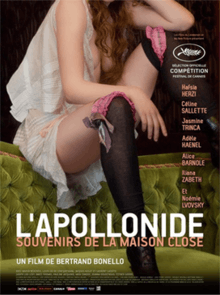House of Tolerance
House of Tolerance (French: L'Apollonide: Souvenirs de la maison close, also known as House of Pleasures), is 2011 French drama film directed by Bertrand Bonello,[2] starring Céline Sallette, Hafsia Herzi, Jasmine Trinca, Adèle Haenel, Alice Barnole, Iliana Zabeth, and Noémie Lvovsky. The film had its world premiere in the Competition section at the 2011 Cannes Film Festival on 16 May 2011.[3]
| House of Tolerance | |
|---|---|
 French poster | |
| Directed by | Bertrand Bonello |
| Produced by |
|
| Written by | Bertrand Bonello |
| Starring |
|
| Music by | Bertrand Bonello |
| Cinematography | Josée Deshaies |
| Edited by | Fabrice Rouaud |
Production company |
|
| Distributed by | Haut et Court |
Release date |
|
Running time | 125 minutes |
| Country | France |
| Language | French |
| Budget | $3.8 million |
| Box office | $1.5 million[1] |
Plot
The story is set in a luxurious Parisian brothel (a maison close, like Le Chabanais) in the dawning of the 20th century and follows the closeted life of a group of prostitutes: their rivalries, their hopes, their fears, their pleasures, and their pains.
Cast
- Céline Sallette as Clotilde
- Hafsia Herzi as Samira
- Jasmine Trinca as Julie
- Adèle Haenel as Léa
- Alice Barnole as Madeleine
- Iliana Zabeth as Pauline
- Noémie Lvovsky as Marie-France
- Louis-Do de Lencquesaing as Michaux
- Xavier Beauvois as Jacques
- Jacques Nolot as Maurice
- Esther Garrel as A prostitute
Production
The genesis of the project was a merge of two film ideas Bertrand Bonello had been thinking of. About ten years earlier he had tried to make a film about modern brothels, but the project had been cancelled. After finishing On War from 2008, Bonello decided that he wanted his next film to be about dynamics within a group of females, and his partner suggested a film about prostitutes in a historical setting. The director then became interested in the aspect of a brothel as a closed world from the viewpoint of the prostitutes. The idea of a scar in the form of a smile came from the film The Man Who Laughs, an adaptation of Victor Hugo's novel with the same name. Bonello says he dreamed about the film two nights in a row while he was writing House of Tolerance, and decided to include a female character with such a scar.[4]
The film was a co-production between Les Films du Lendemain and the director's company My New Picture, in collaboration with Arte France Cinéma. The production received 540,000 euro from the CNC and 416,000 euro from the Île-de-France region, as well as pre-sales investment from Canal+ and CinéCinéma.[5][6] The total budget was 3.8 million euro.[7] Casting took almost nine months. Bonello wanted a mixed ensemble of both professionals and amateurs who above all worked well together as a group.[4]
Filming started in Saint-Rémy-lès-Chevreuse on 31 May 2010 and lasted eight weeks.[5] The film was recorded on one continuous set, which allowed the camera to move between each room without cuts. Bonello chose to focus the camera on the girls and almost never their clients. He explained: "it reinforces the impression that the prostitute is above the client. I told the actresses: 'Be careful, I want twelve intelligent girls.' It was really important for me: they're not being fooled, they are strong women."[4]
Release

The film had its world premiere at the 2011 Cannes Film Festival in the Competition section on 16 May 2011.[3] It was the fourth time a film by Bonello was screened at the festival, and the second time in the main competition, after Tiresia from 2003.[7] It was released in France by Haut et Court on 21 September 2011.[8]
Reception
Critical reception
On review aggregator website Rotten Tomatoes, the film has an approval rating of 83% based on 29 reviews, and an average rating of 7.2/10.[9] On Metacritic, which assigns a normalized rating, the film has a score 75 out of 100, based on 9 critics, indicating "generally favorable reviews".[10]
Phil Coldiron of Slant Magazine gave the film 4 out of 4 stars, writing, "Not many films have ever approached the possibilities afforded by the slippery subjectivity of cinematic time so directly, or with such intelligence."[11] Roger Ebert gave the film 3.5 out of 4 stars, describing it as "a morose elegy to the decline of a luxurious Parisian bordello, circa 1900, a closed world in which prostitutes and their clients glide like sleepwalkers through the motions of sex."[12]
Accolades
| Award | Date of ceremony | Category | Recipient(s) | Result | Ref(s) |
|---|---|---|---|---|---|
| Lumières Award | 13 January 2012 | Best Film | House of Tolerance | Nominated | [13][14] |
| Best Director | Bertrand Bonello | Nominated | |||
| Best Screenplay | Bertrand Bonello | Nominated | |||
| Most Promising Actress | Alice Barnole, Adèle Haenel, Céline Sallette | Won | |||
| César Award | 24 February 2012 | Best Supporting Actress | Noémie Lvovsky | Nominated | [15][16] |
| Most Promising Actress | Adèle Haenel, Céline Sallette | Nominated | |||
| Best Cinematography | Josée Deshaies | Nominated | |||
| Best Original Music | Bertrand Bonello | Nominated | |||
| Best Sound | Jean-Pierre Duret, Nicolas Moreau, Jean-Pierre Laforce | Nominated | |||
| Best Costume Design | Anaïs Romand | Won | |||
| Best Production Design | Alain Guffroy | Nominated | |||
References
- JP. "L\'Apollonide Souvenirs de la maison close (House of Pleasures) (2011)- JPBox-Office". www.jpbox-office.com.
- Smith, Ian Hayden (2012). International Film Guide 2012. p. 118. ISBN 978-1908215017.
- "Horaires 2011" (PDF). festival-cannes.com (in French). Cannes Film Festival. Archived from the original (PDF) on 23 January 2012. Retrieved 7 May 2011.
- Adler, Laure (April 2011). "Conversation between Bertrand Bonello and Laure Adler" (PDF). English press kit L'Apollonide. Films Distribution. Retrieved 8 May 2011.
- Lemercier, Fabien (24 May 2010). "Bonello starts shooting on brothel-set L'Apollonide". Cineuropa. Retrieved 14 April 2011.
- Lemercier, Fabien (1 June 2010). "Ile-de-France backs Free Men". Cineuropa. Retrieved 14 April 2011.
- Lemercier, Fabien (15 April 2011). "Bold trio Cavalier, Bonello and Maïwenn in race for Palme d'Or". Cineuropa. Retrieved 15 April 2011.
- "L'Apollonide – souvenirs de la maison close". AlloCiné (in French). Tiger Global. Retrieved 14 April 2011.
- "House of Pleasures". Rotten Tomatoes. Fandango. Retrieved 26 January 2020.
- "House of Pleasures". Metacritic. CBS Interactive. Retrieved 26 January 2020.
- Coldiron, Phil (22 November 2011). "Review: Bertrand Bonello's House of Pleasures". Slant Magazine. Retrieved 26 January 2020.
- Ebert, Roger (8 February 2012). "House of Pleasures". RogerEbert.com. Retrieved 26 January 2020.
- Lemercier, Fabien (20 December 2011). "The Artist dominates Lumière nominations". Cineuropa. Retrieved 26 January 2020.
- Lemercier, Fabien (16 January 2012). "Surprise win for Omar Sy at Lumière Awards". Cineuropa. Retrieved 26 January 2020.
- Lemercier, Fabien (27 January 2012). "Poliss and The Minister challenge The Artist". Cineuropa. Retrieved 26 January 2020.
- Lemercier, Fabien (25 February 2012). "The Artist coronated favourite at the César, Best Actor award went to Omar Sy". Cineuropa. Retrieved 26 January 2020.
External links
| Wikimedia Commons has media related to House of Tolerance. |